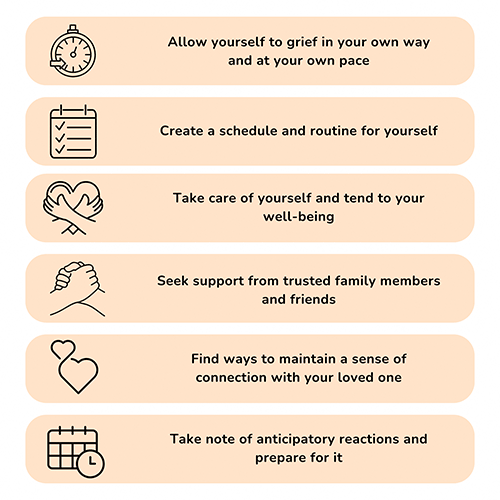
Navigating the complexities of emotions
Everyone’s experience is unique and you may have a combination of positive and negative emotions when you hear that your loved one may not have much time left in this world or when you bid your final farewell to your loved one. It is important to allow yourself to process these emotions in a healthy and supportive manner.
Here are some common emotions of a caregiver:
- Relief: Finally, my loved one is no longer in pain or suffering anymore. It has been a few long trying years for me, and now it has ended.
- Shock: I can’t believe that this is happening to me and my family.
- Gratitude: Glad that I was present during my loved one’s final moments
- Anger: Life is so unfair. Everyone is happy but me. Why should bad things happen to me and my loved one?
What is grief?
Grief is a natural response to a loss we experience. The loss of a loved one can feel intensely painful for some. It is not something we try to get over, but rather, something we learn to face and carry with us. While it may seem almost impossible to get through the anguish in the initial weeks or months after a loss, many bereaved persons have shared that the intensity of grief lessens and eases with time. There is no right or wrong way of grieving, and there is no fixed timeline or schedule to grief.
You may find yourself identifying with some of the common reactions at some point throughout your grief journey:
| Emotional | Physical | Cognitive | Behavioural |
|
|
|
|
Source: Singapore Hospice Council ‘Caring for yourself and others after a death’
Coping with your grief
Oftentimes, we are required to balance between attending to the grief we experience and concurrently managing the adjustments and changed in our day-to-day lives. Here are 6 tips you can use to ease this transition phase.

Know these warning signs
Grief becomes a concern when you find yourself struggling with distress and see yourself experiencing these:
- Prolonged and significant difficulties in managing daily routine and functioning
- Extremely focused on the loss
- Excessive feelings of sorrow, anger resentment or guilt
- Neglecting personal care, hygiene and grooming
- Turning to alcohol and drugs
- Hallucinations
- Persistent thoughts and feelings of being worthless and hopeless
- Inability to find joy, positive feelings or meanings in life
- Prolonged withdrawal from social activities and engagements
- Having thoughts of suicide or self-harm
It is time to seek professional help from these community bereavement service providers below or visit a nearby GP or polyclinic.
Support services to cope with grief
| Services | Contact no. |
|
Assisi Hospice Grief & Bereavement Care For all bereaved persons in the community |
WhatsApp Message: 9787 9890 |
|
Counselling and Care Centre For those who need bereavement counselling |
6536 6366 |
|
Hua Mei Counselling and Coaching For grieving elderly > 50 years old and their family/caregivers |
6593 9549 |
|
SAGE Counselling Centre For bereaved seniors > 50 years old and their families/caregivers |
1800-555-5555 |
|
O’Joy Care Services For those aged 18-49 in need of grief counselling |
6749 0190 |
|
Viriya Community Services For individuals and families impacted by loss |
6256 1311 vtc@viriya.org.sg |
|
Wicare Support Group For widows and their children |
6354 2475 / 9619 5091 |
Source: Singapore Hospice Council (Caring for Yourself after a Death) booklet, page 8
Do note that certain provider charge fees for their counselling sessions.
For more grief counselling services, feel free to browse this list on MyLegacy.
You may use this self-assessment tool on mindline.sg to check your emotional well-being.
If you are keen to read more about managing grief, Caring for yourself and others by Singapore Hospice Council is good resource for you.
